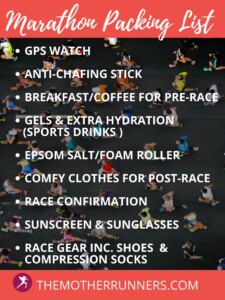It is marathon season! The Chicago Marathon is this weekend. The New York City Marathon and Marine Corps Marathon are just around the bend. The Boston Marathon entries were just accepted.
I was able to heal my injuries and toe the marathon start line twice this past year. But this fall, I am battling another injury. So I am going to live vicariously through you and share all my marathon running tips for marathon day success!
These top marathon training tips and marathon race day tips come from pros, experienced runners, and running coaches so you have race day success. These tips run the gamut of marathon standard operating procedures to

ones you never heard of.
In this article, I will cover:
- How long does it take to train for a marathon?
- What is the best diet for marathon training?
- Should you run 26 miles before the marathon?
- Plus, 26 Pro Marathon Training Tips for Race Day Success!
How long does it take to train for a marathon?

Generally speaking, it takes 20 weeks to train for a marathon. THAT IS for runners who are able to run about 6 miles before starting their marathon training plan. If you are starting from square one, it will likely take 6 to 9 months to train for a marathon. The 20-week plan can start after the runner has built a base in which they can run 6 miles at a time.
What is the best diet for marathon training?
The best diet for marathon training is a practicing good nutrition: a balanced diet of macronutrients including fats, carbs, and proteins. Eat real food and avoid processed ones. Aim for at least 2 snacks and 3 meals daily consisting of those three macro groups.
The more you run, the more you will need to eat. It’s important to fuel before runs lasting longer than an hour and within 30 minutes after a run.
Read about my 2:54 marathon fueling plan using energy gels and sports drinks here!
And, read more marathon training nutrition here.
How long should the longest run be in marathon training?
Your longest run of marathon training depends on what your estimated marathon finish time will be.
If your marathon finish time is:
- below 4 hours, you will likely run 1-3 long runs over 20 miles
- above 4 hours, you will cap your long runs at about 3:30 hours
- about 5 hours, you will cap your long runs to 4 hours. Running longer than that unnecessarily taxes the body and weakens it before race day.
(Please bear in mind that there are many factors in addition to pace that go into a training plan including running background, injury history, age, etc. I advise most marathoners to consult a running coach to train them to the best of their abilities. Learn about my run coaching here.)
Related: The Scientific Benefits of Long Runs
Should you run 26 miles before marathon?
You should NOT run a 26-mile long run before a marathon. This unnecessarily puts stress on the body, increasing the risk of injury or decreased performance on race day. A runner’s peak training week, including the longest run, will be 2 to 3 weeks out from marathon race day. Then the taper period commences.
This timing allows the physiological advancements to occur prior to race day as well as recovery from the training stress to allow the body to rebuild and be strong for race day!
How many miles a week should I run to train for a marathon?
You should run at least a weekly mileage of 25-30 miles over the course of 3 to 5 weekly runs to be able to complete a marathon. Most marathon runners with a time goal of below 4 hours will run close to 50 miles a week.
Check out my marathon training plans.
How do I pick the best marathon training plan?
When looking at a marathon training plan, you need to ensure it builds your mileage gradually over the course of about 20 weeks (with you having a solid base to start).
Marathon training plans with a goal race time will include workout days after a base phase of easy runs that include speed workouts at Vo2 Max, tempo, lactate threshold, and race pace along with long runs.
“These runs are essential to teaching the body to improve glycogen storage, handle glycogen depletion, and manage the decrease in energy as you use up your glycogen. They will also teach you to increase running economy and your emotional and psychological ability to handle the discomfort,” explains run coach, mom of 5, and 2:47 marathoner Carina Heilner.
If your training plan includes these hard workout days, ensure you sandwich them between rest or recovery days. Never do hard run days back-to-back.
My run coaching can guide you in the appropriate workouts to optimize marathon performance.
Related: Do Carbon-plated Shoes Make a Difference?
How should I increase my mileage when marathon training?
Do not increase mileage more than 10-20 percent week over week. Some marathon training plans will increase mileage by 30 percent every 3 weeks. Marathon training plans should also include a cutback in mileage every fourth week or so to allow for you to absorb the training.
Check out my article on Marathon Handbook on how to safely increase mileage.
Related: What Happens to Your Body When You Taper
26 Pro Marathon Training Tips for Running 26.2

With marathon training, practice makes perfect and so does preparation for the good, bad, and the ugly: Because the marathon is a LONG race, and a runner needs to be ready for anything that can happen!
Here are 26 tips from running coaches and experienced runners to help you optimize your race day performance!
-
Show up for your run.
Marathon training is perhaps more about mental training than physical. If you wake up and it’s pouring or your run friend flakes, do not give up. Instead, focus on what IS going right to stop that downward mental spiral of doom—and get out there!
“This teaches you that when you hit a low spot in a race, it’s not the end of the world. This builds that resilience muscle,” shares running coach Amie Dworecki.
-
Reflect on your marathon training.
Periodically review your training log to see your progress. The night before the race, scroll through your Strava or training log to see all the hard work you have put in and how long you have been training for THIS day.
The hay is in the barn.
Related: How to Pace Yourself When Running
-
Prioritize sleep and nutrition over extra miles.
Laura Norris, head coach of Laura Norris Running, has advice for the busy mother runner—prioritize sleep and nutrition.
“If you’re wondering how you fit in a 50-mile week and take care of your kids and go to work while eating and sleeping well, then try running 40 miles a week to make time for the other things,” suggests Norris. “If you skimp on the other things, the higher mileage will often backfire.”
-
Practice fueling.
Practice your marathon fueling on your long runs to ensure your stomach handles the nutrients well and you can easily take it in. Treat your long run nutrition exactly as you would on race day.
Related: How to Train Your Gut
-
Fuel early.

Research shows that marathoners who consume 60 grams of carbs per hour (roughly a gel every 25-30 min) finish faster and experience less of a slowdown in the final 10K, says Norris.
“This is because available blood glucose allows for quick production of energy without depleting glycogen stores. Once you deplete your glycogen stores, your body switches to lipid (fat) metabolism, which can only be done at a low intensity, so you slow down. To avoid that bonk, fuel early and often!”
-
Remember your electrolytes.
Your body loses lots of salt (electrolytes) as your run which can lead to dehydration. Electrolytes are responsible for directing fluid to the right places both inside and outside of your cells. So replenish them with energy gels like SIS or sports drinks like Gatorade or Skratch Labs in between gels or chews.
Related: The Best Sports Drinks for Runners
-
Eat right in the days ahead of the race.
Eat well during your marathon training and select foods in the days leading up to the race that you know your body digests well, advises Chef Luigi Diotaiuti, an avid marathoner. Avoid any new foods 2-3 days ahead of the race or foods with lots of fiber.
Chef Luigi suggests simple foods like vegetables, pasta, and chicken breast. Also, drink more water than usual the days ahead of the race—(and get extra rest since you won’t be able to sleep the night before the race).
Related: How to Carb Load for a Marathon
-
Eat a big lunch.
A lot of people talk about the pasta dinner before your marathon race day but actually lunch is the most important, says nutrition and run coach Claire Bartholic, host of the popular podcast The Planted Runner.
“Eating your biggest meal earlier in the day (at lunch) allows plenty of time for digestion. Then eat normal size meal the night before and a breakfast of what you typically eat before a long run about 2 hours before the race,” she explains.
-
Make time for the extras.
Do the extras like foam rolling, drills, mobility, and strength work to run more efficiently, have more power, and ensure proper form. If you train for your marathon with poor form, you will reinforce this poor form and put yourself at risk for a decrease in performance and injury.
Related: Running Drills for Faster Running
-
Prepare for the worst-case scenario.
When doing pre-race visualization, do some sequences where you have to go to the bathroom, or you drop your gel, or your shoe comes untied, or the weather is bad. Imagine how you will respond so that you aren’t caught off guard on race day.
-
Have a backup plan.
Things happen. Hurricanes. Bad weather. Upper respiratory infections. Have a contingency plan for race day. “Rather than waste 9 months of training, have a back-up marathon to enter within a 3-week window of the chosen marathon,” suggests Howell.
12. Check the weather forecast.
Well in advance, runners can see the average condition for that date and that time of year, but starting around ten days out, they can track the weather more exactly, advises Dworecki. Select the outfit you will wear on that day plus some backups for weather changes. Be sure you’ve worn the clothes and know they work well.
-
Carry-on your race day gear.

Dworecki also advises to carry on your race day fuel and clothes on the plane, so they don’t get lost before race day. Then lay them out, bib pinned on, the night before.
-
Don’t wear new shoes on race day.
You never want to try out a new pair of running shoes on race day. That’s a great way to find out if they give you blisters or not enough arch support on the big day. If you buy special race day shoes (I’m looking at you Nike Alphaflies!), be sure to try them out and break them in on a couple of runs and workouts.
-
Lube up everything.
And I mean EVERYTHING! Get Body Glide or Vaseline and apply it to every area a seam or band hits, and completely cover your feet to prevent blisters.
-
Check out the course map.
(Or even better, drive the course!) Learn where there will be turns or hills or downhills. Use this to mentally visualize you nailing your race! Also, learn where the water and gel stops will be so you can plan your nutrition plan. Also, if you have a race plan, memorize it and envision yourself nailing it on the course and crossing the marathon finish line PROUD.
Related: How to Strength Train for the Marathon
-
Practice water stops.
Speaking of water stops, you can practice picking up your water cup on your run by setting up your own table with a cup, advises Dworecki. This will save time and mistakes of dropping cups.
-
Arrive early.
Give yourself enough time to use the bathroom several times, standing in those long lines, and get to the start line early to calm nerves, advises Thomas Watson, founder of Marathon Handbook. “Plan to arrive to the start line area with oodles of spare time, get yourself acclimatized, and visit those portapotties (even if there’s a long queue!).”
-
Put your name on your bib or clothes.
This is a genius tip from Dworecki that helps when the going gets tough. “People will yell your name and give you a mental boost,” she explains.
Related: Where to Carry Your Fuel During a Marathon
-
Practice pacing.

Have an idea of what your race pace will be and practice it in runs leading up to the race. For example, add in some race pace miles in long runs. You can do a prediction of race paces using this Run Smart Project calculator.
-
Don’t go out too fast.
“You are going to feel GREAT at the start of the race. So don’t mistake that feeling by going too fast,” advises mother runner Katie Rey. Most marathoners should start out about 30 seconds slower than race pace and speed up after the first several miles. If you use a pace group, check your watch and make sure the pacer is running the right speed.
-
Don’t trust the GPS.
But don’t rely on GPS for pacing—especially in large cities or remote areas where the signal may not be strong. You can use the clocks at mile markers or just run by feel.
-
Have a mantra and look away from the watch.
Pick a mantra that helps you stay calm and confident, and connects to your “why.” Repeat that to yourself when the going gets tough. Focus on those words instead of your watch. Stressing about your pace will only lead to anxiety, making it hard to breathe.
-
Run the tangents.
Learn to run the tangents to avoid running more than you must.
“Try to run in as straight a line as possible through curved sections. Some races have the shortest course marked. If this is the case, follow that line, rather than the outer edges of the road, which can actually add unexpected distance to your race,” says Dworecki.
-
Run the terrain.
Try to do training runs on the terrain of your race to prep the legs. If your race is going to be hilly, practice hills. Flat? Aim to do long runs on a flat path. Trail run? Aim to do some of your long runs on trails. This will help prepare you mentally and physically.
-
Believe in yourself.
Mother runner Gadeer says not to believe in others, or the watch, or the clock—believe in yourself. Truly, if you don’t believe you can do it, then you won’t—no matter how much preparation you do. You’ve worked hard and are ready. Time to get what you earned.
If you want guidance with your running goals, including a customized marathon training plan, check out my run coaching services. Also, be sure to check out my free training plans:
